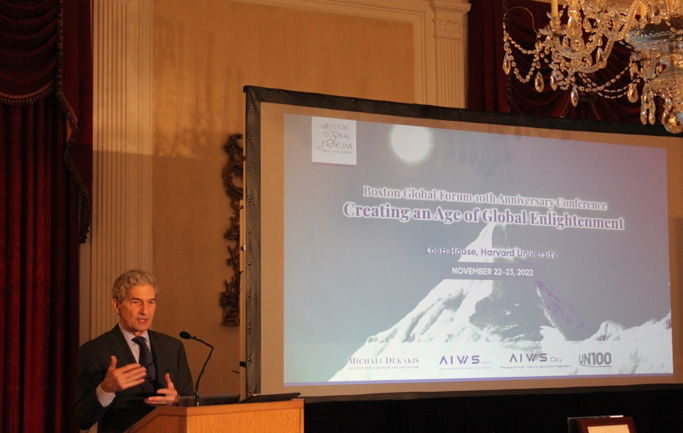I appreciated from the representative of Taipei. It reminds us that you can have a democracy with Chinese characteristics. Taipei and Japan both demonstrate that democracy is not just a Western concept. The urge for self-determination is a universal and fundamental part of what makes us humans.
It’s an honor to be here with you and so many distinguished Japanese public servants who worked with Shinzo Abe, who showed that security goes hand in hand with a strong economy and international cooperation.
Yesterday I mentioned the major international gatherings at COP27 and the FIFA World Cup. I began yesterday morning at 12:00 participating in a panel at another international gathering, the Global Partnership on Artificial Intelligence Summit taking place in Tokyo. GPAI is a legacy of Shinzo Abe, launched during Japan’s G20 presidency.
That presidency also launched Data Free Flows with Trust, an initiative that is gaining traction through the creation by the U.S. and Japan
Now Japan is about to assume the presidency of the G7 in a consequential time.
Let speak about the broader contact of these multilateral gatherings and efforts like the Boston Global Forum and the Forum for Cooperation on AI that I co-lead at the Brookings Institution.
We are in a changing world. The international order that emerged from World War II and then the end of the Cold War no longer works. No one country or set of countries can operate alone, not the United States or United Nations or China. The problems we face are global – climate change, disinformation and misinformation, poverty and disease. Russia’s brutal invasion of Ukraine has changed the stakes
These problems demand global solutions. Americans are familiar with what Benjamin Franklin said in another difficult time as members of the Continental Congress risked their lives in revolt against the British Crown: “We must all hang together, or we will hang separately.”
The White House National Security Council released a new national security strategy a month ago to address the development of a new national order, called “What Comes Next.” Its answer is “a new rules based order” that “builds on what came before.” The U.S. is willing to “partner with any nation” on two tracks:
- “We will cooperate with any country, including our geopolitical rivals, that is willing to work constructively with us to address shared challenge” and
- “We will deepen our cooperation with democracies and other like minded states.”
I think framing this as a rules-based order makes sense. That makes it open to any regardless of its governance. We can cooperate with China on some issues, as we saw at COP27.
One of the important aspects of the U.S. strategy is that it elevates economic security on a par with strategic security. That’s something I worked toward when I was part of the Obama administration. It takes a page out of Shinzo Abe’s book. It is important in a digital era when a global digital economy works across sectors and regional or national lines.
In speaking about networks, I am reminded of what Robert F. Kennedy said in South Africa about how change comes. He spoke of “a million different centers of energy and daring” that create ripples, “and those ripples can build a mighty wave ….” Over time, ripples crossing fa network of networks can build a wave that forms a new international order.
Anne-Marie Slaughter has compared international relations to networks. The Internet that connects our world is a network of networks. And this new international order will have to be built like those digital networks – with many different nodes that provide diversity, redundancy, and resiliency. Different coalitions on different issues – Data Free Flow with Trust in the G7, the Christchurch Declaration, where private sector companies came together with the government of New Zealand after the attack carried live on Facebook and YouTube to agree on ways to take down similar incidents, bilateral efforts like the US-EU Trade & Technology Council and regional groups like APEC and ASEAN, multi-stakeholder groups like standards development organizations whose work will play an increasingly role in an ICT-driven world.
In describing a network of networks, I am reminded of Robert F. Kennedy’s description in South Africa of how change comes. He spoke of making ripples and said that “those ripples, intersecting from a million different centers of energy, can build a mighty wave ….” We need millions of rip.
